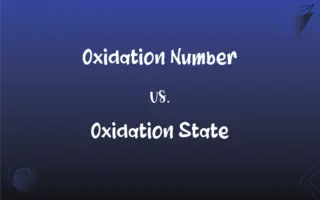Will vs. Shall: What's the Difference?
Edited by Janet White || By Harlon Moss || Published on November 25, 2023
"Will" typically expresses future actions or intentions, while "shall" is more formal and often implies obligation or command.

Key Differences
"Will" is commonly used to indicate future events or actions based on the speaker's decision or intention. In contrast, "shall" is used, especially in formal contexts, to express a strong assertion or intention, often relating to rules or laws.
In everyday speech, "will" is the preferred choice to talk about the future. "Shall," however, is more formal and often found in legal or official documents to express mandatory actions or obligations.
"Will" can also express a promise or a voluntary action, showing the willingness or determination of the speaker. "Shall" is used in questions to offer or seek suggestions or instructions, particularly in British English.
The use of "will" often reflects personal decisions or predictions. On the other hand, "shall" is used in a more impersonal sense, conveying necessity or inevitability, especially in legal contexts.
"Will" is more subjective, reflecting the speaker's perspective, while "shall" has an objective tone, implying a sense of duty or requirement that is often beyond the speaker's personal preference.
ADVERTISEMENT
Comparison Chart
Usage
Indicates future actions or intentions.
Implies obligation or command.
Formality
Common in everyday speech.
More formal, used in legal or official texts.
Expression
Shows willingness, determination, or promise.
Offers or seeks suggestions, instructions.
Context
Personal decisions, predictions.
Impersonal, necessity, inevitability.
Tone
Subjective, speaker's perspective.
Objective, duty or requirement oriented.
ADVERTISEMENT
Will and Shall Definitions
Will
Will indicates future actions or intentions.
I will go to the store later.
Shall
Shall denotes a strong assertion or intention in formal contexts.
The company shall deliver the goods on time.
Will
Will expresses a decision made at the moment of speaking.
I will have coffee, please.
Shall
Shall is used in legal documents for mandatory actions.
The tenant shall pay the rent monthly.
Will
Will is used in predictions.
It will rain tonight.
Shall
Shall implies a formal obligation or requirement.
You shall abide by the rules.
Will
Will reflects a habitual action in the future.
I will usually visit my grandparents on Sundays.
Shall
Shall is used in formal questions to offer or seek advice.
Shall we proceed with the plan?
Will
Will shows determination or promise.
I will finish this project by tomorrow.
Shall
Shall suggests a formal future arrangement.
The meeting shall take place next week.
Will
The mental faculty by which one deliberately chooses or decides upon a course of action
Championed freedom of will against a doctrine of predetermination.
Shall
Used before a verb to indicate the simple future tense in the first person singular or plural.
I shall sing in the choir tomorrow.
I hope that we shall win the game.
Will
Diligent purposefulness; determination
An athlete with the will to win.
Shall
Used similarly to indicate determination or obligation in the second and third persons singular or plural.
(determination): You shall go to the ball!
(obligation): Citizens shall provide proof of identity.
Will
Self-control; self-discipline
Lacked the will to overcome the addiction.
Shall
Used in questions with the first person singular or plural to suggest a possible future action.
Shall I help you with that?
Shall we go out later?
Let us examine that, shall we?
Shall
(obsolete) To owe.
Shall
To owe; to be under obligation for.
Shall
To be obliged; must.
FAQs
Is "will" more common than "shall"?
Yes, "will" is more commonly used than "shall" in everyday English.
Is "shall" often used in legal contexts?
Yes, "shall" is frequently used in legal documents to express obligations.
Can "will" express a promise?
Yes, "will" can be used to make promises or commitments.
Can "will" be used for spontaneous decisions?
Yes, "will" is often used for decisions made at the moment of speaking.
Can "will" be used in questions?
Yes, but it's less common and more informal than using "shall" in questions.
Is "shall" common in American English?
"Shall" is less common in American English and is more formal or legalistic.
Is "shall" more formal than "will"?
Yes, "shall" is generally more formal and authoritative than "will".
Does "shall" imply a stronger sense of duty than "will"?
Yes, "shall" carries a stronger implication of duty or requirement.
Does "will" have different forms for different subjects?
No, "will" remains the same for all subjects.
Can "shall" be replaced by "will" in legal documents?
It's not recommended as "shall" has a specific legal implication of obligation.
Is "shall" used to seek advice?
Yes, especially in questions, "shall" is used to seek advice or opinions.
Is "shall" used in offers or suggestions?
Yes, especially in British English, "shall" is used in questions to offer or suggest.
Can "will" be used for habitual actions in the future?
Yes, "will" can express habitual actions or routines in the future.
Does "shall" have a future tense aspect?
Yes, but it's more about obligation or formality than simple future tense.
Is "shall" used in commands?
Yes, "shall" can be used in formal commands or instructions.
Is "shall" used in everyday conversation?
It's less common in casual conversation and more used in formal or legal contexts.
Is "will" used in predictions about the future?
Yes, "will" is commonly used for making predictions.
Can "will" be used in conditional sentences?
Yes, "will" is commonly used in the main clause of conditional sentences.
Can "will" be used to express a habit?
Yes, "will" can describe a future habit or routine.
Can "will" indicate willingness?
Yes, "will" can show a person's willingness to do something.
About Author
Written by
Harlon MossHarlon is a seasoned quality moderator and accomplished content writer for Difference Wiki. An alumnus of the prestigious University of California, he earned his degree in Computer Science. Leveraging his academic background, Harlon brings a meticulous and informed perspective to his work, ensuring content accuracy and excellence.
Edited by
Janet WhiteJanet White has been an esteemed writer and blogger for Difference Wiki. Holding a Master's degree in Science and Medical Journalism from the prestigious Boston University, she has consistently demonstrated her expertise and passion for her field. When she's not immersed in her work, Janet relishes her time exercising, delving into a good book, and cherishing moments with friends and family.































































